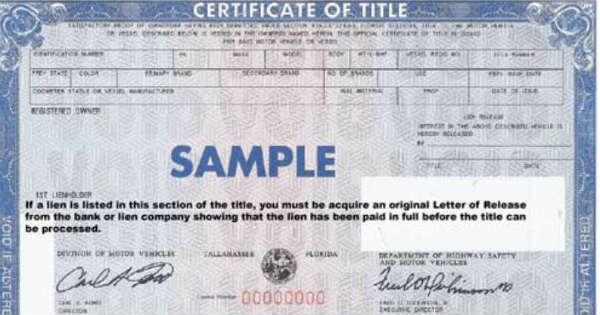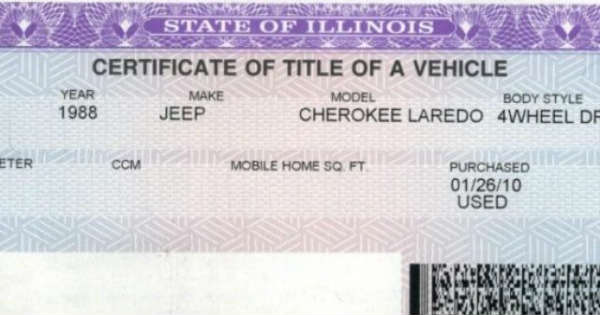What’s the deal with car titles? How do you get one? Why do you need one? Read on to learn everything you need to know about car titles. A car title is an important piece of paperwork. Without it, there’s no proof your car is really yours. Whether buying a new car from a dealership or buying a used car on Craigslist, the car’s title should be part of the deal. Here’s a look at everything you need to know about car titles.

What Is a Car Title?
The title for your car is an official document showing proof of ownership.
The state issues a title to the legal owner of the car. And it follows a car from one owner to the next.
You might be thinking that you’ve bought a brand new car from a dealership, but you didn’t come home with the title. You drove your new car off the lot with no title to show for it.
Unless you paid cash in full for your car, you financed it. And until you pay the full financed amount, your lender legally owns your car. They’ll have the title.
When you’ve made your last car payment, you’ll receive the title showing that you are now the legal owner of your car.
Types of Car Titles
Did you know that the type of title can change for a car?
In a perfect situation, a car lives a long life with one owner and no accidents. One title for the life of the car.
However, depending on the lifecycle of a car, the state updates the title to reflect a few different circumstances.
Clear Title
A clear title is a fresh, clean title. When you receive your car’s title in the mail after your final payment, you have that title “free and clear.”
Clear titles don’t have a lien. It’s paid off and yours.
Salvaged Car Titles
If a car suffers severe damage beyond reasonable repair expenses, your insurance company will “total” the car.
But that might not be the end of your car’s life.
Salvaged cars have some value for parts and scrap metal. In some cases, a brave soul purchases a repaired salvaged car to save money.
Others will purchase a salvaged car as a project to repair themselves. These are even braver souls.
Once a car receives a classification of “salvaged” it might receive a “salvaged car” title.
If you’re considering a car branded as “salvaged,” be careful. Have it inspected by a third-party mechanic.
Also, be aware that it could be trickier to get the car registered for the road. And insurance rates could be high on a salvaged car.

Reconstructed Title
A car that’s torn apart and rebuilt might no longer qualify as the original car described in the original title.
In this case, it might be necessary to get a reconstructed car title. This type of title is up to date with current info about the car.
Junk Title
When a salvage yard buys a car intended for parts, the title can switch to a junk car title.
This shows that the salvage yard legally owns the car but it’s not intended for the road. The car is now set for a life of sitting in the yard and offering its parts for sale.
Bonded Titles
Sometimes the title is missing from a car. Maybe it’s lost, stolen, or otherwise misplaced.
In this case, a bonded title bridges the gap. But, it should be a last resort.
Getting a bonded title requires purchasing a bond in the amount of the car’s value. It’s often less expensive to buy a car with a clear title.
Transferring a Title
When selling a car to another individual or back to a car dealership, the title transfers to the name of the new owner.
It’s important to officially transfer the title if you no longer own a car. This transfers all responsibility and liabilities for the car to the new owner.
When it comes time for DMV registration renewal, the new owner should be the legal name tied to the car.
The seller does the title transfer. The process requires filling out some information about the car on the title and sending it to the state.
Using Your Car’s Title
Your car’s title is useful for more than documenting the legal ownership of a car. Use your car’s title as collateral for a loan.
We call this an auto title loan.
These are not big loans. And they are fast loans usually good for up to twelve months. But if no other collateral is available to you for quick cash, use your car as a financial asset.
Auto title loan amounts range between a few hundred to a few thousand dollars. For an auto title loan approval, the title must be yours free and clear.
Like other loan applications, you’ll also need other financial documents. And you must have a current automobile insurance policy for the car.
Always Confirm a Title
Whether you buy your car from a dealership or an individual, always check the title for accuracy.
Confirm the correct spelling of your name if you’re the legal owner.
And double check the VIN (Vehicle Identification Number). Even a brand new title from a dealership can have a typo. The VIN on the title must match the VIN on your car.
If buying a car from someone you don’t know, ask to see the title before you complete the sale. They should have the title readily available.
Confirm the VIN matches between the car and the title. And do a quick VIN search through Carfax or another source. Verify the details about the car match what the seller says.
Car Titles Tell a Story
Car titles are not only required, but they also help tell a car’s story.
The history of a car is critical when purchasing a used car. Without the title, you won’t have the whole story.
New cars aren’t always better than used cars. But used cars need a little more investigating to make sure you’re getting what you pay for.
Before your next car purchase, read more about how to choose the right car for your lifestyle.

